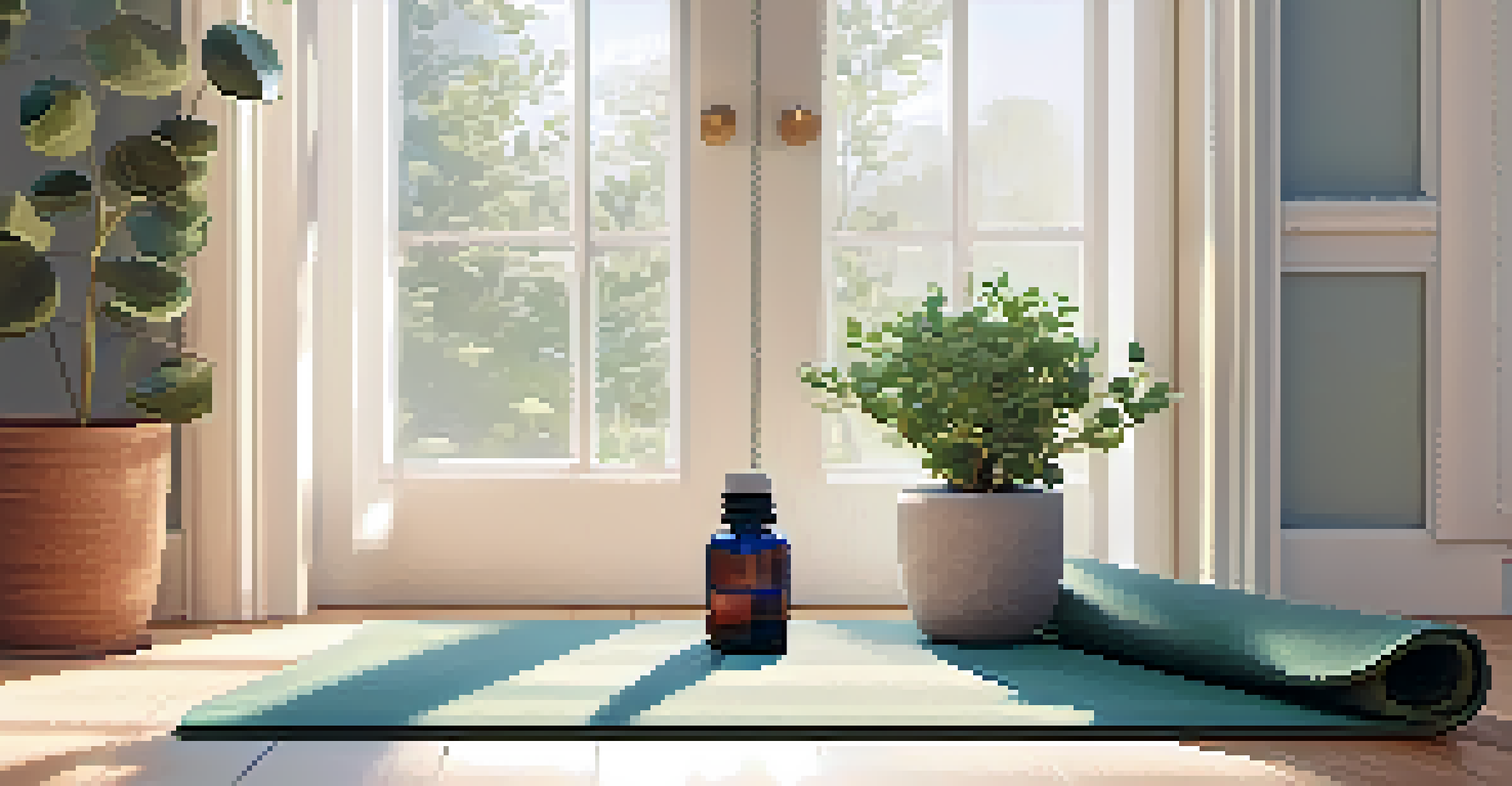The Role of Essential Oils in Stress Relief and Relaxation

Understanding Stress and Its Impact on Our Lives
Stress is a common experience that affects many aspects of our lives, from our mental health to our physical well-being. It can be triggered by various factors, including work pressures, family responsibilities, and unexpected life changes. Understanding stress is the first step toward managing it effectively, as it allows us to identify its sources and work towards alleviating them.
The greatest weapon against stress is our ability to choose one thought over another.
Chronic stress can lead to serious health issues, such as anxiety, depression, and even cardiovascular problems. The body's response to stress involves the release of hormones like cortisol, which can disrupt normal bodily functions when produced in excess. This is where natural remedies, such as essential oils, come into play to help restore balance and promote relaxation.
Incorporating essential oils into your routine can provide a gentle yet effective way to combat stress. These oils, derived from plants, have been used for centuries in various cultures for their therapeutic properties. As we delve into their benefits, let's explore how they can enhance your journey to relaxation.
What Are Essential Oils and How Do They Work?
Essential oils are concentrated extracts from plants that capture their natural fragrance and therapeutic properties. These oils can be obtained from various parts of the plant, including leaves, flowers, and roots. When inhaled or applied to the skin, they interact with the body's olfactory system and can trigger emotional responses, helping to promote feelings of calm and relaxation.

The science behind essential oils involves aromatherapy, which is the practice of using these oils for therapeutic benefits. When you breathe in the aroma of essential oils, it stimulates the limbic system, the part of the brain that regulates emotions. This connection explains why certain scents can evoke memories or feelings, making them powerful allies in stress relief.
Understanding Stress Effects
Stress significantly impacts both mental and physical health, making it essential to identify its sources for effective management.
Different essential oils have unique properties that can cater to various emotional needs. For instance, lavender is known for its calming effects, while citrus scents like lemon can uplift your mood. Understanding how these oils work can empower you to choose the right ones for your stress-relief routine.
Popular Essential Oils for Stress Relief
Some essential oils are renowned for their stress-relieving properties. Lavender oil, often described as the quintessential calming scent, is frequently used in relaxation practices. Its soothing aroma can help reduce anxiety and promote sleep, making it a favorite for those seeking tranquility after a hectic day.
Stress is not what happens to us. It's how we respond to what happens. And response is something we can choose.
Another popular choice is chamomile, which has been used for centuries to ease tension and promote relaxation. Its gentle floral scent can be particularly helpful when dealing with stress before bedtime. Similarly, bergamot essential oil, derived from the bergamot orange, is known to alleviate feelings of stress and depression, making it a wonderful addition to your self-care routine.
Don't forget about eucalyptus and peppermint oils, which can invigorate your senses while simultaneously helping you unwind. These oils can clear the mind and promote a sense of clarity, making them perfect for those moments when stress feels overwhelming.
Methods to Use Essential Oils for Relaxation
There are various ways to incorporate essential oils into your stress-relief routine, each offering unique benefits. One of the most popular methods is diffusing, where you add a few drops of your chosen oil to a diffuser, allowing the scent to permeate your space. This not only creates a calming atmosphere but also enables the therapeutic properties of the oils to be inhaled throughout the room.
Topical application is another effective method, where you can dilute essential oils with a carrier oil (like coconut or jojoba oil) and apply them to pulse points such as wrists or neck. This method provides a direct connection between the oil and your body, allowing for enhanced relaxation. Just remember to perform a patch test to avoid any skin irritation.
Benefits of Essential Oils
Essential oils offer natural therapeutic properties that can help alleviate stress and promote relaxation through various methods of use.
Lastly, adding essential oils to your bath can create a soothing ritual that helps melt away stress. A few drops of lavender or chamomile in warm water can transform an ordinary bath into a tranquil escape, giving you the perfect opportunity to unwind.
Creating a Stress Relief Routine with Essential Oils
To effectively use essential oils for stress relief, it's important to create a routine that fits seamlessly into your daily life. Start by identifying moments that trigger your stress, such as busy mornings or hectic workdays. Incorporating essential oils during these times can help you navigate stress more gracefully.
For instance, you might choose to diffuse calming oils like lavender or chamomile while getting ready in the morning. Alternatively, you could apply a grounding blend to your wrists before a challenging meeting. The key is to be intentional about using these oils, allowing their benefits to enhance your daily experiences.
Consider also setting aside time each week for self-care rituals that include essential oils. Whether it’s a quiet evening bath or a meditation session, these dedicated moments can create a sanctuary for relaxation, making stress relief a priority instead of an afterthought.
Combining Essential Oils with Other Relaxation Techniques
Essential oils can be even more effective when used alongside other relaxation techniques. For instance, combining essential oils with deep breathing exercises can amplify their calming effects. As you inhale the aroma of your chosen oil, focus on your breath, allowing your body to relax more deeply.
Meditation is another powerful practice that pairs beautifully with essential oils. By adding a few drops of your favorite calming oil to a diffuser while you meditate, you create an environment conducive to tranquility. This combination can help you cultivate a deeper sense of peace and clarity.
Safe Use of Essential Oils
Using essential oils safely involves proper dilution, selecting high-quality products, and considering individual health conditions.
Yoga is a fantastic activity to incorporate essential oils as well. Applying oils like eucalyptus or peppermint to your skin before a session can enhance your practice, promoting both physical and emotional relaxation. The combination of movement, breath, and scent creates a holistic approach to stress relief.
Precautions and Considerations When Using Essential Oils
While essential oils offer numerous benefits for stress relief, it's important to use them safely and responsibly. Always dilute essential oils with a carrier oil before applying them to the skin to prevent irritation. Additionally, pregnant women, nursing mothers, and those with specific medical conditions should consult with a healthcare professional before using essential oils.
Not all essential oils are created equal, so it's essential to choose high-quality, pure oils from reputable sources. Look for oils that are labeled as 100% pure and free from synthetic additives. This ensures that you’re getting the therapeutic benefits you seek without any harmful chemicals.

Lastly, be mindful of any potential allergens. If you're trying a new oil for the first time, perform a patch test on a small area of skin. This way, you can enjoy the calming effects of essential oils while keeping your health and safety in check.